
Product test
Samsung Galaxy Z Fold 6 review: screen, interpreter and e-reader
by Michelle Brändle

Bring on Gen 5! Samsung improves the Galaxy Flip a little with each generation. This year, it’s the turn of the battery and cameras. My test will show whether this is enough.
I finish an e-mail and, bang, I snap close the Flip, completely satisfied. Looking for a restaurant? Wham, I triumphantly pull out the Samsung and flip it open. The folding mechanism is fun in the fifth generation too. It’s a conscious act every time, opening your mobile phone. Then just close it and smartphone time is over again.
For me, this is one of the main arguments in favour of small folding phones. I use them much more consciously than a normal smartphone, and I’m much less likely to pull out my device and press something just to keep myself occupied.
Samsung was the first brand to make the concept of a full-size foldable smartphone suitable for mass production. The Galaxy Flip 6 is already the fifth generation (because there was no Flip 2).
In everyday use, the Galaxy Flip 6 has to prove that Samsung’s tactic is still working, namely improving the Flip slightly year after year while staying away from more major innovations.
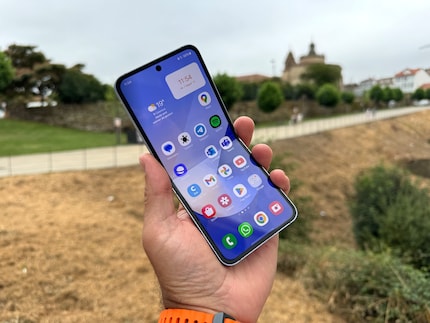
Instead of 3,700 mAh as in the Flip 5, the Flip 6 has a built-in battery with 4,000 mAh. In everyday life, I usually just got through the day. If I used the camera a lot, downloaded data from the mobile network and used Google Maps as a navigation system, I had to grab a power bank.
For me, the battery life is okay, but it’s still not really good. This is also evident in the PC Mark 3.0 Battery Life Test, which simulates intensive use. Of the phones tested under the same conditions, the Flip 6 achieved the worst score.
The Flip has finally got a better main camera with a resolution of 50 megapixels instead of 12. It now uses the same sensor as the Galaxy S24 and S24+. Samsung has also improved the sensor with the wide-angle lens – but not in terms of resolution. The selfie camera with 10 megapixels, which I only used for video calls, has stayed the same. It’s fine for that, but I wouldn’t necessarily take pictures with it.
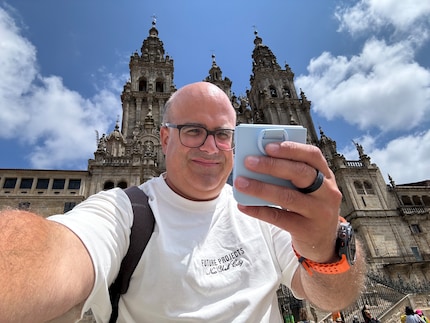
I always took selfies with the main camera. It worked great since I could use the outside screen as a viewfinder. A useful tidbit: when taking photos, the Flip automatically turns on a delay. I start the camera by double-clicking the power button, then I tap the touchscreen once and a three-second countdown starts.
To compare photo quality, the Samsung smartphone has to compete with another top-of-the-range model, namely the iPhone 15 Pro. This phone’s available from around 900 francs, a similar price range to the Flip 6.
As it turns out, selfies with the main camera are impressive too. The snapshot in front of the cathedral in Santiago de Compostela looks flat on the iPhone pic (right). Everything is equally sharp and has been heavily post-processed by the software. This looks good on the phone screen, but many details are lost. Individual pixels can be seen on the forehead, for example.
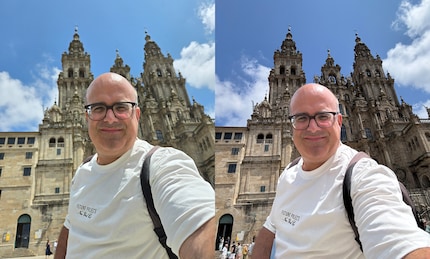
The selfie shot with the Flip’s main camera, on the other hand, has a natural depth. The person in the foreground is in focus, the background slightly blurry. Incidentally, both models didn’t really nail the colours. Samsung’s photo has a bit too much of a yellow tint, while the iPhone’s is a bit too reddish.
How does the Flip compare to the main camera of the iPhone 15 Pro, which has a resolution of 48 megapixels? According to the test, it holds up very well, for example in this shot with difficult lighting conditions. The cathedral is under shade, while the sky and the street are comparatively bright.
Samsung brightens the façade significantly more than Apple, and the blue of the sky is also emphasised. Again, the Flip photo is much more yellowish, but that doesn’t bother me, and the colour of the stones isn’t bad at all. Overall, the quality of the pictures is similarly good. The 15 Pro stays closer to reality and looks less dazzling, while the Flip 6 takes an Instagram-ready picture that doesn’t need much editing.
This whole idea of «different, but equally good» is confirmed in night shots. The iPhone shows the yellow lantern in greater detail, while the folding phone displays all the details of the red lantern. The leaves of the branch are more clearly recognisable on the iPhone, while they look more natural on the Flip. I like both shots very much – even if they each offer a slightly different look.
Let’s take a look at the wide-angle camera. Both Samsung and iPhone have a built-in 12-megapixel sensor. The results are convincing in both cases – despite massive amounts of backlight in the shot. On the other hand, the Flip is brighter and the software intervenes more than on the 15 Pro. The houses look good, but the area around the sun is a little overexposed.
Overall, the Samsung Galaxy Flip 6 now keeps up with the best of the best thanks to the upgrade to the main camera. It even beats most other smartphones when it comes to selfies. However, you’ll have to do without an optical zoom.
This high quality standard is also evident in videos. The integrated microphones are usable, even when it’s a bit windy. If you film in a vlog style, you can additionally record your own commentary and the rest of the footage in the same quality, as this example shows.
By the way, camcorder mode is very useful. I hold the Flip horizontally and fold one half of the screen to a 90-degree angle. Now the video viewfinder is on one half of the screen, while the other half serves as a holder and control element. It’s a really great solution for shake-free shots, and it gives me that video camera feeling.
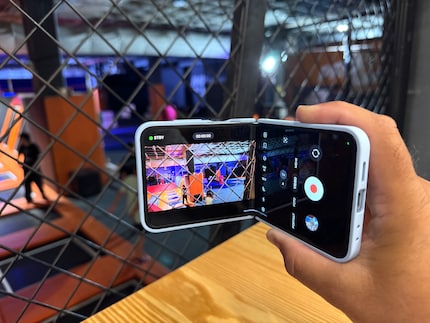
While Samsung’s improved the battery and cameras, it’s also equipped the Flip 6 with the latest top processor for Android smartphones, as it does every year. This time, it’s the Snapdragon 8 Gen 3. As a result, the foldable phone can really show off in the benchmarks. It can easily keep up with flagships such as the two Ultra models from Xiaomi and Samsung.
The regular Galaxy S24 with Samsung’s own Exynos processor clearly lags behind, even the Pixel 8 Pro with Google’s processor is outperformed. Perhaps even more importantly, in the benchmark test, I measured a clear difference to the predecessor, the Galaxy Flip 5.
However, two things are much more important than these measurements. The Flip runs smoothly and without delays in everyday use. The performance is excellent, and the chip enables the Flip 6 to receive seven years of Android updates and security patches. Its predecessor only gets four years of Android updates and five years of security updates.
I noticed three negatives in my test. The battery still only charges with a maximum of 25 watts from the mains. Samsung also continues to do without the new Qi2 standard for wireless charging. In summer temperatures, the Flip 6 also became noticeably hot again and again. It can still be used without any problems, but the performance of the processor is significantly reduced. I realised this when I tried to run benchmark tests at an inside temperature of almost 30 degrees – and got values that were far too low, on top of a hot casing.
Samsung hardly changed anything in terms of design. The rings around the two camera lenses in the same colour as the housing are a pleasing visual accent. However, as with the Fold, I’d have liked a thinner, more elegant and more modern case.
The Flip 6 doesn’t feel any different to its predecessors in everyday use. The screen may be brighter, but it was already more than adequate before. The fold in the, well, foldable display is still noticeable and visible depending on the incidence of light. That didn’t bother me in the past, and even now it wouldn’t be a reason for me to spurn the flip phone.
However, there was one area where the lack of innovation bothered me – the exterior display. It still only displays widgets. If you want to use apps, you have to install them via a workaround.
Widgets optimised for the 1.5-inch screen are actually more suitable than apps designed for large screens. But unfortunately, the applications available are often far too simple. For example, take the widget for messages. I can reply directly from the outside screen – even with clever, AI-generated text blocks – but I can’t see the entire conversation in a chat, only the last message and my reply.
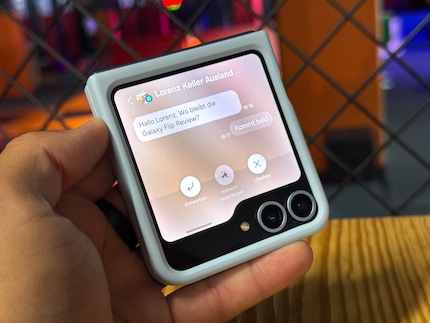
Here’s another example. In the Spotify widget, I only have access to a small selection of albums, podcasts and playlists. I can’t access my downloads or subscribed podcasts via the outside screen.
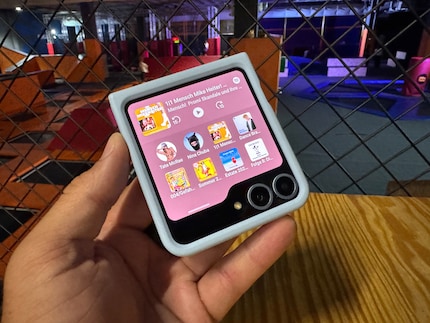
As a result, I open the Flip much more often than I actually need to. That’s a shame, since the appeal of small flip phones to me lies precisely in being able to do certain basics without having to switch to the big screen. Without being tempted to scroll through social media or check your e-mails either.
Use of the external display for translations is truly innovative. A person can see questions or answers in a second selected language – and is also shown when they can speak again.
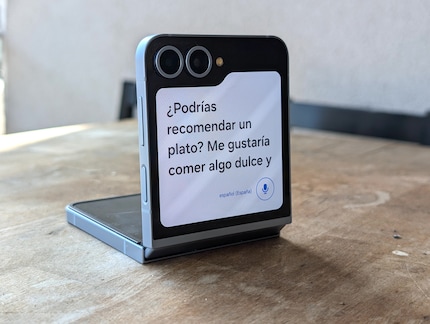
This is also the only AI feature that I really used while on vacation in Italy and Spain. I tried out the rest, such as photo editing or creating sketches from photos or my own drawings, but I swiftly forgot about them day to day. You can find more details here in this article by fellow editor Michelle.
Finally, I have to recommend the cover with its integrated ring. At first I found this accessory unnecessary. Sure, a case is a must for such a luxury device, but I wouldn’t hang my phone by a strap.
However, I’ve become a fan. I use the ring to support my finger. A positive, as the Flip is top-heavy when open and tends to tip forward. With the cover, I can hold it firmly. In addition, the device can even be positioned at a slight angle using the ring when watching videos in landscape format.
The current Flip generation is better than ever. The processor was already in the top range before, and now the camera system is too. Especially if you regularly use the selfie camera, there’s hardly a better alternative than this flip phone.
However, the Flip 6 is still as expensive as a flagship – even if there are already significantly discounted models a few weeks after the market launch, depending on the version. I’d have expected a better battery life and improved usability of the outside screen given this. More innovation, less settling.
If you’re looking for a compact flip phone, you can’t go wrong with the Galaxy Flip 6. An upgrade from the Flip 5, on the other hand, is hardly worth it.
Pro
Contra
Gadgets are my passion - whether you need them for the home office, for the household, for sport and pleasure or for the smart home. Or, of course, for the big hobby next to the family, namely fishing.